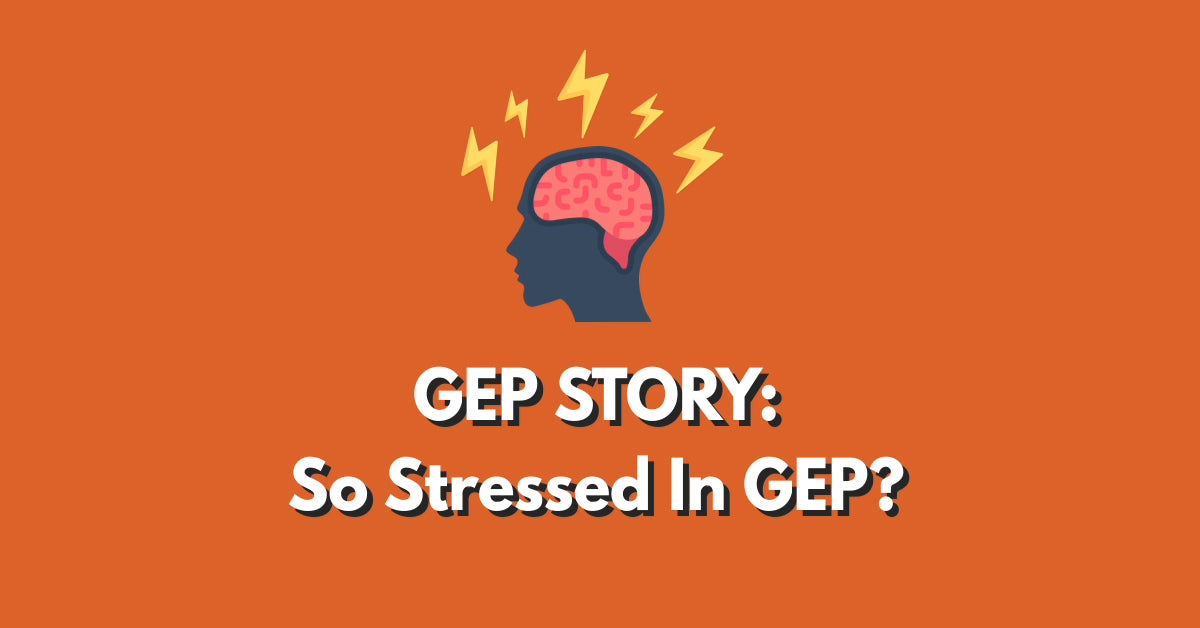
GEP Story 4: So Stressed in GEP?
How will students be assessed in GEP? What are the major projects for GEP students? How do GEP students perform in PSLE and DSA?
Story of GEP- Part 4 So Stressed in GEP?
Now that your child’s journey in the GEP has begun, you may wonder how students will be assessed in GEP, and whether they will have a long list of projects in the pipeline? Will GEP affect your child’s PSLE score? In this post, we will try to address your concerns.
How will students be assessed on their progress in GEP?
Will there be any written examinations?
Yes. Exam papers are set by the GE Branch in MOE.
For GEP students, will coursework be more effective than written examinations?
Both coursework and written examinations are effective in their own ways. For coursework, due to the constant supervision by teachers and refinement of their work, students learn valuable ‘soft skills’ such as research skills and communicating effectively. On the other hand, written examinations serve as a useful benchmark for GEP students to assess how much they have learnt in the past year.
At the end of the GEP, are students required to take the PSLE?
All GEP students are required to sit for the PSLE at the end of Primary 6.
a. Since GEP is a differentiated curriculum, will students be well-equipped for PSLE?
It is arguable that for students in the GEP, the curriculum will help them to be more well-equipped for the PSLE than compared the mainstream curriculum. This is because the GEP is specifically catered to intellectually-gifted students. While the emphasis is on higher-order thinking skills, the depth of the curriculum means that they will have a strong foundation in the PSLE subjects. However, Preparation for PSLE is done later compared to mainstream students. Less drills for PSLE preparation are given to GEP students compared to mainstream students.
b. How well do GEP students score for the PSLE?
Generally, GEP students are able to place in the top percentile. Many GEP students are among the PSLE top scorers list. However, not all GEP students can perform well in PSLE. GEP selection process is to sieve out the intellectually gifted who might not be the top students driven by exam scores.
It is arguable that the GEP is designed to nurture a love for learning, rather than going through the grind of PSLE with hot-housing and constant drill and practice. There are some students who are gifted in one domain such as mathematics , weak at language subjects, and as a result, obtained a relatively lower PSLE score.
What achievements attained during the GEP will help in my child’s Direct Schools Admission (DSA) to a secondary school?
All GEP students will have to go through PSLE today. GEP should not be seen as a shortcut to the top secondary schools. Nevertheless, there are many GEP students who obtain direct admission because of their exceptional talent in Mathematics, English, Science and other talent. This is not measured by how high their academic score is but rather how they apply their talents in these fields.
As the DSA is a discretionary process carried out by respective secondary schools, it will be good to enquire with the secondary school that you want your child to apply for.
How many major projects are there for the 3 years GEP programme?
-
The individualised Study Options (ISO) is a unique feature of the GEP. Under the ISO, students will get to choose from different types of project work.
-
Individual research study (IRS): In Primary 4, Students will be taught core research skills such as library research skills, data gathering skills, data analysis skills and report writing skills. In Primary 5, students who have chosen research skills as their emphasis for project work will be able to embark on a research project based on their own interests! A student will come up with a hypothesis and carry out a comprehensive research on his or her hypothesis. Students with the best projects will be able to present and conduct a panel presentation or exhibit their projects.
-
Innovation program (IvP) Students who have an interest in innovation and invention can choose the IvP. In the IvP, students will apply their knowledge and creative thinking to create something that can help solve a real-world problem. This program is designed for students to see the relevance in what they are studying in the classes and bring what they have learnt into real-world contexts. One example is the creation of an application to reduce queue times in the school canteen.
-
Community Involvement Projects: Students learn to work in groups and brainstorm ideas to contribute to the community. They may also get the opportunity to work with external organisations to help in issues such as pollution and environmental conservation. Through such projects, students have increased social interaction with the community around them.
There is so much more to the GEP other than the children’s mental development. The next blog post focuses on their psychosocial development. We will focus on the joys frustrations students face in the GEP as they interact with one another and the world around them.
Join our GEP Camp here!
Written by Gifted and Talented Education Pte Ltd
www.gifted-school.com
Copyright © Gifted and Talented Education
All content is subjected to copyright and not to be reproduced or republished.
Feel free to share this post with your friends and family on social media!
